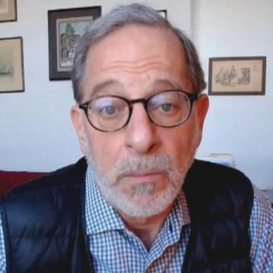CASA@AUC in the Palace
Students in the Center for Arabic Student Abroad (CASA@AUC) program are back to taking classes in AUC’s oldest building, the historic palace, which has been overlooking downtown Cairo for more than 150 years.
“This move serves as a symbolic homecoming, highlighting the program’s growth and reaffirming its success and commitment to offering students a dynamic environment for Arabic language learning and cultural immersion.”
CASA@AUC students had been studying at the historic palace before relocating to New Cairo in 2008 with the rest of the University. They didn’t remain there for long and returned to AUC Tahrir Square with a dedicated space in Hill House, allowing students to experience the vibrance of downtown and engage in cultural events that enrich their learning. This year, they are back to studying in the historic palace, where AUC originally conceived the program.
“The return to the palace is highly significant, as CASA@AUC continues to fulfill its mission of immersive Arabic language and cultural education,” said Iman Soliman, senior instructor and chair of the Department of Arabic Language Instruction. “This move serves as a symbolic homecoming, highlighting the program’s growth and reaffirming its success and commitment to offering students a dynamic environment for Arabic language learning and cultural immersion.”
“[This] revives a longstanding tradition of teaching the liberal arts, which include the study of language, in a setting defined by beauty and heritage."
Hear what CASA@AUC students feel about studying in the historic palace:
“Studying Arabic in the heart of Cairo at the historic AUC Tahrir campus is such a privilege. The campus's beautiful grounds and architecture, coupled with its modern facilities, are like an oasis for study and reflection. And all at arm’s reach from the energy and excitement we love about downtown Cairo.”
Jaron Sutton
“The return of the CASA@AUC program to the historic palace at AUC’s Tahrir Square campus revives a longstanding tradition of teaching the liberal arts, which include the study of language, in a setting defined by beauty and heritage. With its stunning architecture, lush greenery and walls adorned with the names of renowned scholars from the Islamic and Arab tradition, there is simply no better place for CASA@AUC to thrive. The campus serves as a reminder of Egypt’s rich intellectual heritage and an inspiration to carry this legacy forward.”
Dani Bin Abdul Rahim
“I spent some time doing research at AUC's archives last year and came across several photos of Umm Kulthum and her takht performing at Ewart Hall. When I found out that CASA@AUC would be held at the old campus, these images immediately surfaced in my mind. I was beyond excited to study in a historic place where these monumental musicians once performed. I still pinch myself every morning as I walk past Ewart Hall on the way to class, thinking of Kawkab al-Sharq, Muhammad al-Qasabji and all the other greats who have walked these halls, filling the place with music.”
Kira Weiss








